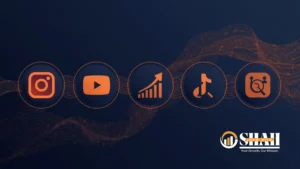The Powerful Connection Between Social Media and SEO You Can’t Ignore
The Connection Between Social Media and SEO You Can’t Ignore
In today’s ever-changing world, social media SEO has become one of the most important factors in every digital marketing strategy. While social media and SEO (Search Engine Optimization) may seem far apart to the naked eye, they actually work side by side to build brand awareness, drive traffic, and improve search engine rankings. In fact, even industry leaders like Moz have emphasized how social engagement, shares, and content visibility can influence SEO performance. To dominate your online presence and reach your target audience more effectively, you need to first understand the connection between social media and SEO.

Why SEO Matters for Social Media
How Social Media Impacts Search Rankings
Even though Google has confirmed that social signals are not entirely direct ranking factors, they can still have a significant social media impact on SEO through indirect means. Engagements such as likes and SEO, shares and SEO, and comments and SEO can help improve your content reach, leading to higher visibility, traffic, and eventually backlinks—a core SEO ranking factor.
Social Media Optimization and SEO
Optimizing your social channels (also called Social Channel Optimization (SCO)) means aligning your channels with your SEO strategies for social media. This will consist of updating your bios regularly with social media keywords, ensuring that you have consistent branding across platforms, and using Open Graph meta tags and alt text for social media images.

Keyword Research and Optimization
Using Keywords in Social Media
Effective keyword research for social media is fundamental and can have a huge impact. Utilize social media keywords, long-tail keywords for social media, and always know to avoid keyword stuffing in social media posts. Search intent and social media alignment is necessary. Hashtags can also act like keywords on platforms such as Instagram and Twitter, so choose your hashtags for SEO wisely.
SEO Keyword Strategy for Social Content
You need to develop a solid SEO keyword strategy that includes:
- Keyword clusters for social SEO
- Platform-specific keywords
- Keyword variations across all your campaigns
Optimizing Social Media Platforms for SEO
Platform-Specific SEO Tips
| Platform | Optimization Tips |
| YouTube SEO | Use video transcripts, keyword-rich titles, and descriptions |
| Instagram SEO | Optimize your Instagram marketing strategy by enhancing your bio, using Instagram Reels SEO, and targeting the right hashtags. |
| Facebook SEO | Focus on Facebook’s About section as well as their reviews |
| Twitter SEO (X SEO) | Include Twitter bio keywords and optimize your tweets |
| LinkedIn SEO | Work on LinkedIn profile optimization |
| Pinterest SEO | Optimize Pinterest pin descriptions with engaging keywords |
| TikTok SEO | Use TikTok search optimization for better chances of detection |
| Reddit SEO | Target Reddit branded searches and relevant groups |
| Quora SEO | Optimize Quora answer optimization with relevant keywords |
Social Signals and Engagement
Role of Engagement in SEO
Social media engagement is a reflection of content relevance. The more user engagement metrics you can create, the stronger and higher your brand reach will be.
- Click-through rate (CTR) and SEO are linked to one another . More clicks mean better rankings.
- High social media traffic signals you provide quality content.
- Social media interactions will drive conversations and lead to higher dwell times.
Backlinks and Link Building
Building Links Through Social Media
Backlinks from social media are generally nofollow links, but they have a huge contribution to organic backlinks when shared by bloggers and influencers. Focus your energy on link building through social media by sharing valuable and original content and using social sharing buttons.
Influencer backlinks also play a fundamental role. Encourage more influencer collaborations, promote influencer-driven traffic, and consider social media influencer partnerships as part of your social media backlink strategy.
Content Strategies That Maximize Social SEO
Creating Shareable and SEO-Friendly Content
- Prioritize shareable content with emotional or practical value.
- Focus on high-quality content for SEO that provides solutions.
- Plan a unique and organic social media content strategy that uses content pillars for social SEO.
- Apply visual content SEO (infographics, memes) and video content SEO (shorts, reels).
- Anchorage user-generated content and SEO for more credibility.

Repurposing Blog Content for Social Media
Distribute blog content and social media posts strategically throughout your social media. Repurpose long-form content into:
- Instagram reels
- Pinterest infographics
- YouTube explainer videos
- LinkedIn articles
Local SEO and Social Media
Amplify Local Reach
If you’re targeting local audiences, optimize for social media and SEO by:
- Use location-based keywords
- Maintaining your NAP consistency (Name, Address, Phone)
- Encourage local reviews and SEO that will have an impact via Facebook reviews for SEO
- Increase local engagement on social media through community events
Influencer Marketing for SEO
Leveraging Influencers to Increase Rankings
Influencer strategies play a huge role in strengthening social media and SEO. They help expand reach and build authority through high-engagement backlinks. Consider:
Strategies include:
- Introducing brand ambassador programs
- Building influencer SEO strategies
- Monitoring influencer engagement
Technical SEO for Social Media
Enhance Indexing and Discoverability
- Utilize alt text for social media images
- Add video subtitles and SEO practices for accessibility
- Ensure social media profile optimization
- Apply social meta module across all blogs
- Implement image SEO for social media and video SEO for social media
- Make use of social media bio keywords efficiently
Brand Awareness and Authority
Building Trust Through Social Media
Boost your brand awareness through social media by:
Building brand visibility today requires more than just content—it demands a strong link between social media and SEO. By maintaining brand consistency across platforms, you boost recognition and trust. Social signals like comments, shares, and reviews act as SEO trust signals, helping search engines recognize your brand’s credibility. When your audience engages regularly with your content, it supports your ranking and increases organic reach. Together, social media and SEO work to enhance authority, visibility, and long-term brand growth.
Analytics and Tools
Tracking SEO-Social Performance
Use these tools to measure the ROI of social media and SEO campaigns:
- Social media analytics platforms
- Google Analytics for social media insights
- Social listening tools to monitor brand mentions
- SEO tools for social media like SEMrush, Ahrefs
- Keyword research tools to guide hashtags and content choices
- Tracking social media traffic for ROI
- SEO performance tracking in accordance with social media performance metrics
Platform-Specific Key Features to Use
Use unique tools across platforms to boost social media and SEO:
- Instagram Reels SEO to reach your explore pages
- YouTube video transcripts for indexing your content
- Pinterest pin descriptions for targeting proper keyword
- Facebook About section for local keywords and engagement
- LinkedIn profile optimization to be ranked in B2B searches
- Twitter bio keywords for branded search and content relevance
- TikTok search optimization for trending and visibility
- Reddit branded searches to dominate your niche terms
- Quora answer optimization for authority building
- Social media polls for engagement to improve visibility
New Trends Shaping Social Media SEO
Stay up to date with the evolution of social media and SEO through:
To stay ahead, brands must embrace AI optimization for social media (AIO) to gain insights and boost performance. Tracking trends like reels, lives, and threads helps shape a stronger social media and SEO strategy. As video content dominates, using it improves both visibility and engagement. Social listening offers real-time SEO signals based on user behavior, while keeping up with Google updates like BERT and MUM ensures your content stays relevant. Optimizing for social media search engines and using trending hashtags also improves discoverability. And with most traffic now mobile, a mobile-first SEO and social media approach is essential.
Final Tips
Quick wins for your social media and SEO efforts:
- Improving social media content discoverability
- Encouraging cross-platform content sharing
- Driving social media and organic traffic to your website
- Leveraging social media content indexing by search engines
- Considering social media and page rank contributions
- Encouraging social media and brand searches
- Tracking social media and conversion rates
- Increasing social media and customer loyalty
- Merging your social media and digital marketing effortsAs platforms evolve, staying ahead means adopting a future-ready social media marketing strategy—because SEO and social media integration is no longer a choice but a necessity.

Conclusion
The connection between social media and SEO is a vital part of modern digital marketing. By effectively using social SEO, engaging with social signals, and creating share-worthy, original content, you can position your brand for long-term success. Social media and SEO work hand in hand—while social platforms drive traffic and engagement, SEO ensures that content is discoverable and optimized.
If you’re looking to build a powerful online presence that ranks and resonates, it’s not just about optimization—it’s also about building your identity across platforms. Learn the 10 proven steps to grow your brand on social media and create a strategy that fuels both visibility and connection.
Whether you’re aiming to boost SEO through social sharing, build brand authority, or improve search engine rankings, integrating social media and SEO is no longer optional—it’s essential. A strong social media and SEO strategy can elevate visibility, grow your audience, and build lasting digital relevance.







